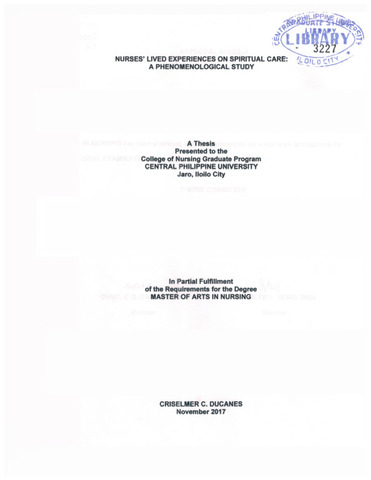Nurses’ lived experiences on spiritual care: A phenomenological study

Page views
803Petsa
2017May-akda
Tagapayo ng Tesis
Tagapangulo ng Panel ng Depensa
Magbahagi
Metadata
Ipakita ang buong tala ng item
Abstract
The provision of spiritual care is a professional responsibility of a professional nurse. However, challenges and barriers on the provision of spiritual care are still encountered by nurses despite of their emphasis on the importance of spiritual nursing. Thus, exploring nurses’ lived experiences on providing spiritual care can address and allay these issues and concerns. This study aimed to explore the lived experiences of nurses on spiritual care. The participants were chosen purposively and saturation principles were applied in which five participants who were known to give spiritual care to patients were interviewed. Data were analyzed using the Colaizzi’s descriptive phenomenological strategy. In-depth interview was used to collect data. All interviews were audiotaped and transcribed by the researcher. Ethical principles were maintained throughout the study. Five major themes emerged from the study describing the lived experiences of nurses on spiritual care. These are Spiritual Care is Creating Connection, Healing Outcomes of Spiritual Care, Spiritual Care Deepens One’s Spirituality, Diversity of Giving Spiritual Care and Barriers to Spiritual Care. Overall, the participants of this study described their lived experiences on the provision of spiritual care and the whole structure of the phenomenon emerged as “Spiritual Care is Caring Holistically from the Heart”. The essence of the phenomenon runs across all identified themes of the study.
These findings cannot be directly generalized, but they could act as a basis for further study on the development of knowledge relative to the provision of spiritual care. The identified themes formed the basis for the formulation of recommendation guidelines on the provision of spiritual care to patients by nurses. It was recommended that identifying, planning, implementing and evaluating effective strategies, interventions and programs/training to improve the provision of spiritual care to patients should be consistently implemented by hospital managers and administrators. Identifying the spiritual needs of patients and designing a care plan could have a great impact on nurses’ effectiveness in providing spiritual care for patients. In planning effective strategies, nurses must acknowledge patients’ life experiences that could have positive impact, utilize therapeutic communication, reminisce patients’ meaningful events, and appropriately recommend patients to spiritual health care providers if necessary. Implementing strategies for spiritual care requires the use of intuition and appropriate behavioral interventions which depend on the level of self-awareness possessed by a professional nurse. To measure the effectiveness of spiritual care interventions, the nurse could ask the patient directly and carefully observe his/her physical, verbal and non-verbal cues. Moreover, enhancement programs, initiatives and training on spiritual care for nurses should be initiated in order to provide holistic nursing care. Finally, future studies examining spiritual care experiences and the extent to which nurses share the same view across countries, other religious affiliations and varied age group must be explored.
Paglalarawan
Abstract only
Mungkahing Sipi
Ducanes, C. C. (2017). Nurses’ lived experiences on spiritual care: A phenomenological study (Unpublished master thesis). Central Philippine University, Jaro, Iloilo City.
Uri
ThesisMga Paksa
Mga keyword
Kagawaran
School of Graduate StudiesDegree
Master of Arts in NursingLokasyon ng Istante
GSL Theses 610.73072 D855
Pisikal na paglalarawan
ix, 126 leaves


